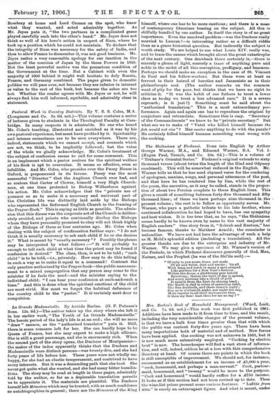• Pastoral Work in Country Districts. By V. S. S.
Coles, MA. (Longmans and Co. 3s. 6d. net.)—This volume contains a series of lectures given to students in the Theological Faculty at Cam- bridge. In many respects it is admirable. No one who heard Mr. Coles's teaching, illustrated and enriched as it was by his own pastoral experience, but must have profited by it. Spirituality and intense earnestness are to be seen everywhere. There are, , indeed, statements which we cannot accept, and counsels which are not, we think, to be implicitly , followed; but the value of the whole we gladly acknowledge. Mr: Coles's treatment of 'the.subject of confession seems to call for some comment. This is an implement which a pastor zealous for the spiritual welfare of his flock is apt to overvalue. It seems so effective, even so infallible. And Mr. Coles, who presides over the Piney House in Oxford, is prepossessed in its favour. Piney was the most successful "Director" that the Anglican Church ever had, and so zealous that Carter of Clewer, himself a very High Church- man, at one time protested to Bishop Wilberforce against his action. Mr. Coles acknowledges that the "private use of penance so as to make it a necessary and universal part of the Christian life was distinctly laid aside by the Bishops who represented the Reformed English Church in the framing of the Prayer-Book." This is saying as little as possible. The admis- sion that this disuse was the corporate act of the Church is deliber- ately avoided, and priests who continually disobey the Bishops whom they have personally promised to obey will not think highly of the Bishops of three or four centuries ago. Mr. Coles when dealing with the subject of confirmation further says : "I do not think it is usually necessary to ask each child if he or she desires it." What is meant by "usually necessary" ? Possibly the phrase may be interpreted by what follows :—" It will probably be enough to tell each child at what time the priest may be found if confession is desired." The class, then, is not to be told ; "eta child" is to be told,—i.e., privately. How easy to do this telling in such a way as to make it equal to a command ! Contrast the only practice authorised by the Prayer-book—the public announce- ment to a mixed congregation that any person may come to the minister if he feels the need—and the minister saying to the individual child : "I can hear your confession at such-and-such a time." And this is done when the spiritual emotions of the child are most vivid. Nor must we forget the habitual deference of the country child to the "pastor." It certainly next door to compulsion.










































 Previous page
Previous page